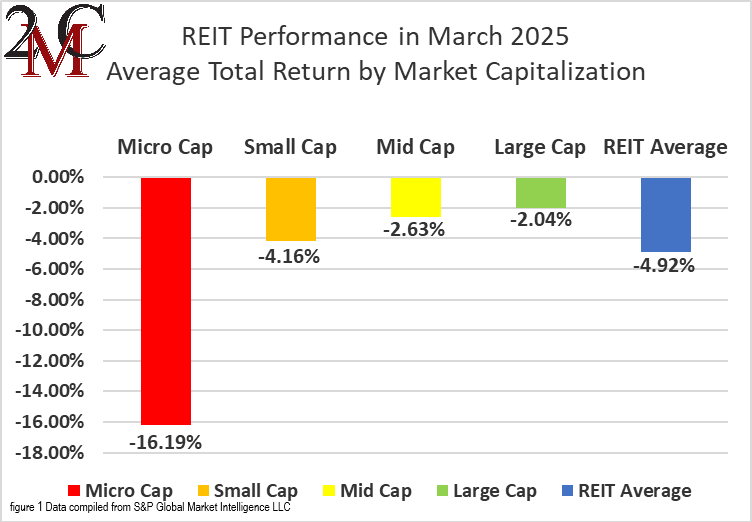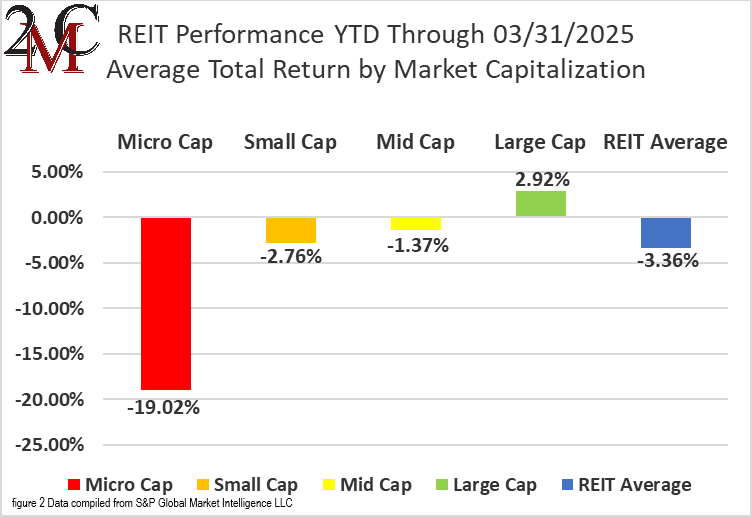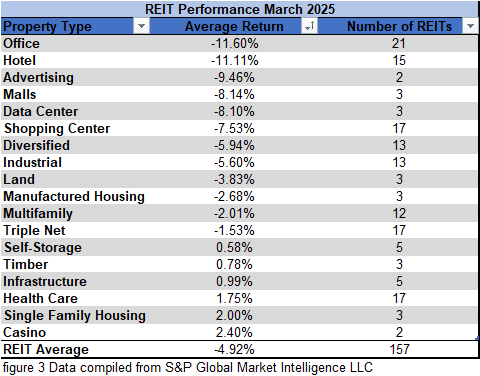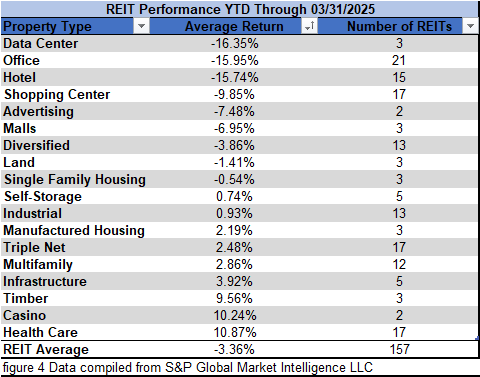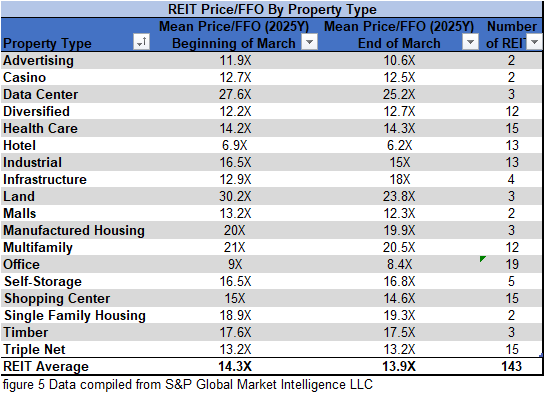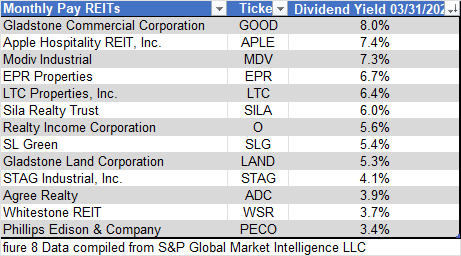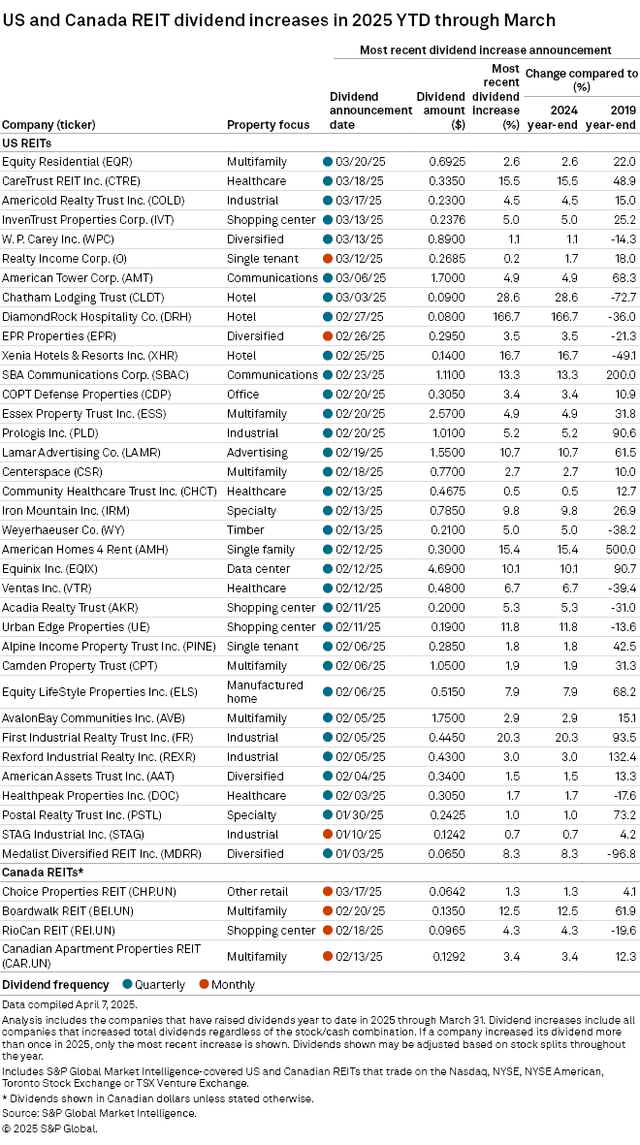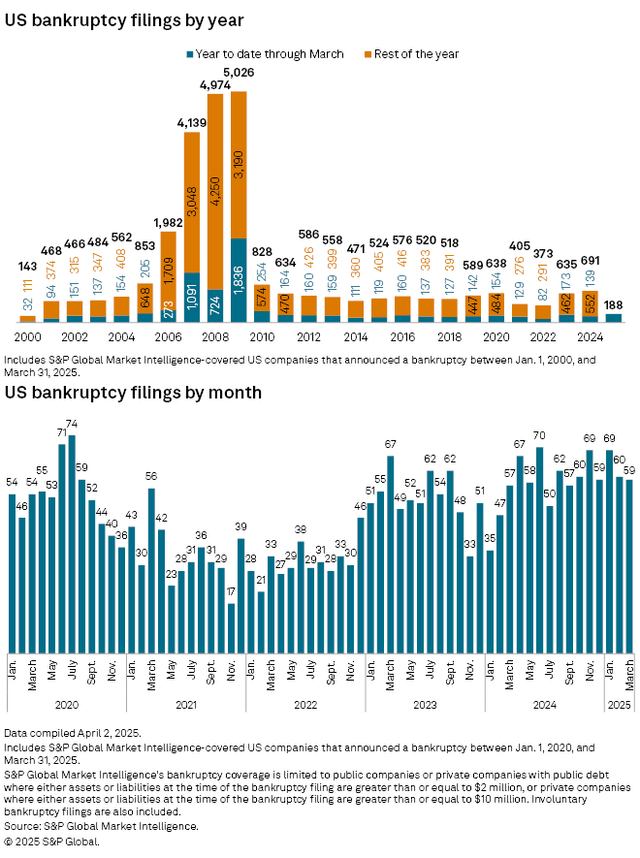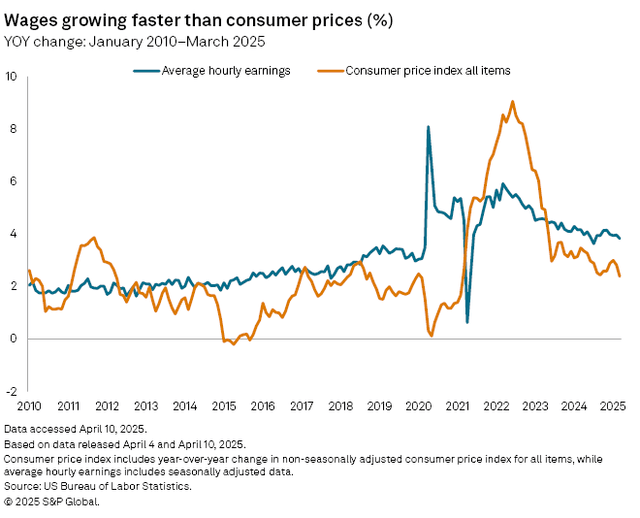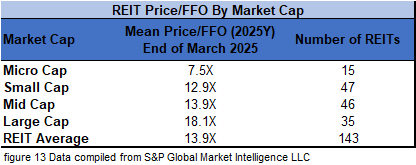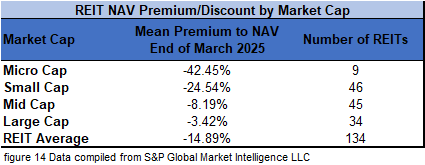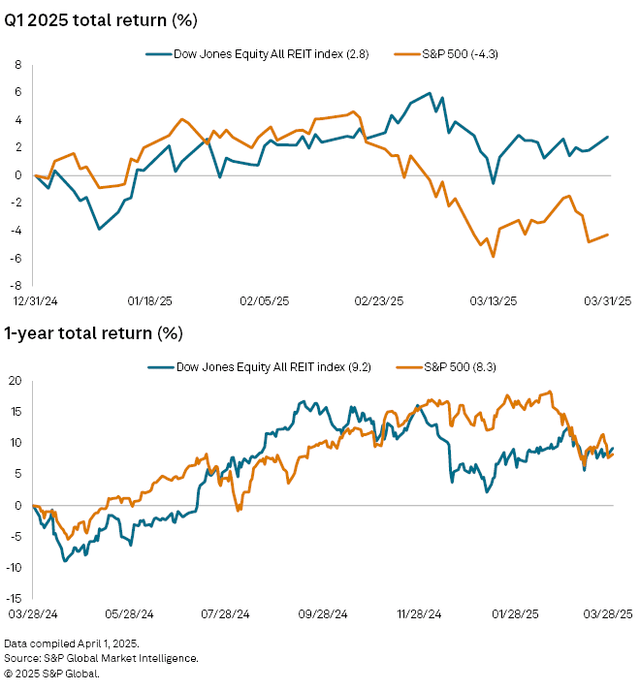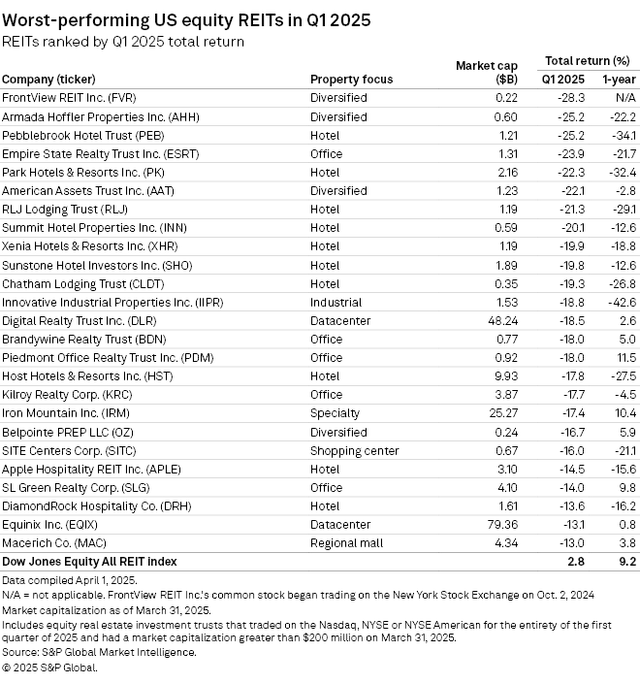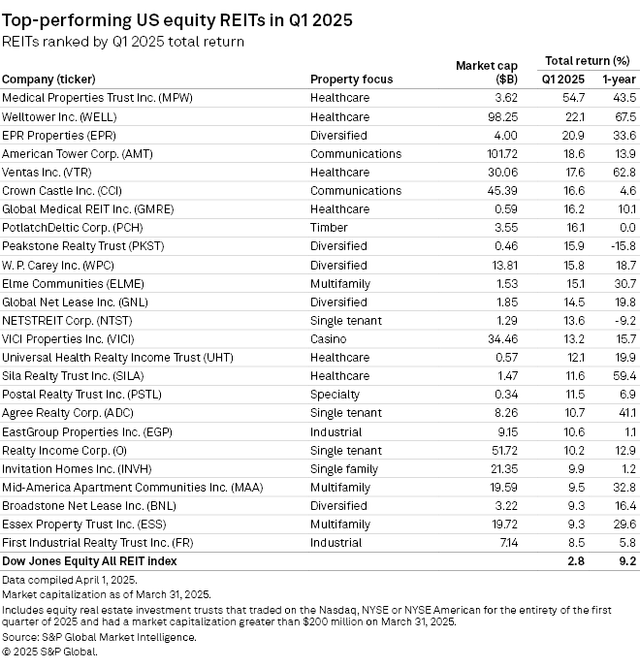The State of REITs: April 2025 Edition
- REITs finished the first quarter of 2025 in the red (-3.36%) with a brutal -4.92% average total return in March.
- Large cap (-2.04%) and mid cap REITs (-2.63%) saw modest losses, but small caps (-4.16%) and micro caps (-16.19%) had a particularly bad month.
- Only 29.49% of REIT securities had a positive total return in March.
- Two thirds of REIT property types averaged negative total returns in March. Office (-11.60%) and Hotel REITs (-11.11%) averaged double digit declines, whereas Casino (+2.40%) and Single Family Housing REITs (+2.00%) outperformed.
- The average REIT NAV discount widened from -11.22% to -14.81% during March. The median NAV discount also widened from -13.47% to -17.43%.
REIT Performance
March was a tough month for REITs with a disappointing -4.92% total return. The REIT sector fell short of the Dow Jones Industrial Average (-4.1%), but saw smaller average losses than the S&P 500 (-5.6%) and NASDAQ (-8.1%). The market cap weighted Vanguard Real Estate ETF (VNQ) outperformed the average REIT in March (-2.58% vs. -4.92%) and has dramatically outperformed year-to-date (+2.69% vs. -3.36%). The spread between the 2025 FFO multiples of large cap REITs (18.1x) and small cap REITs (12.9x) widened again in March as multiples contracted 0.2 turns for large caps and 0.4 turns for small caps. Investors currently need to pay an average of 40.3% more for each dollar of FFO from large cap REITs relative to small cap REITs. In this monthly publication, I will provide REIT data on numerous metrics to help readers identify which property types and individual securities currently offer the best opportunities to achieve their investment goals.
Micro cap REITs (-16.19%) yet again underperformed their larger peers in March. Large caps (-2.04%) continued to outperform followed by mid caps (-2.63%) and small caps (-4.16%). After the first quarter of 2025, large cap REITs have outperformed small caps by 568 basis points.
12 out of 18 Property Types Averaged Negative Returns in March
Only 33.33% of REIT property types averaged a positive total return in March. There was a 14% total return spread between the best and worst performing property types. Casino (+2.40%) and Single Family Housing (+2.00%) led the REIT sector in March. Office (-11.60%) and Hotel REITs (-11.11%) averaged double-digit declines.
Data Centers (-16.35%), Office (-15.95%) and Hotels (-15.74%) badly underperformed other REIT property types in the first quarter of 2025. Health Care (+10.87%), Casino (+10.24%) and Timber (+9.56%) led the REIT sector in Q1.
The REIT sector as a whole saw the average P/FFO (2025Y) decrease 0.4 turns in March from 14.3x down to 13.9x. 27.8% of property types averaged multiple expansion, 66.7% averaged multiple contraction and 5.6% saw multiples hold steady in March. Data Centers (25.2x), Land (23.8x), Multifamily (20.5x), Manufactured Housing (19.9x) and Single Family Housing (19.3x) currently trade at the highest average multiples among REIT property types. Hotels (6.2x) and Office (8.4x) are the only property types that average single-digit FFO multiples.
Performance of Individual Securities
Peakstone Realty Trust (PKST) (+13.10%) was the best performing REIT in March followed by Crown Castle (CCI) (+12.44%) and CareTrust REIT (CTRE) (+11.77%). No other REIT achieved a double-digit positive return in March. Peakstone’s outperformance was particularly strong relative to the dismal -11.60% average total return for Office REITs In March.
Wheeler REIT (WHLR) (-75.88%) continued to freefall in March and has now already declined -95.31% in just the first 3 months of 2025. This marks the continuation of a multi-year collapse in Wheeler’s share price as the shopping center REIT continues to severely underperform its peers.
Only 29.49% of REITs had a positive total return in March. REITs averaged a -4.92% return in March 2025, which was a significantly worse performance for the sector than in March 2024 (+3.26%).
For the convenience of reading this table in a larger font, the table below is available as a PDF as well.
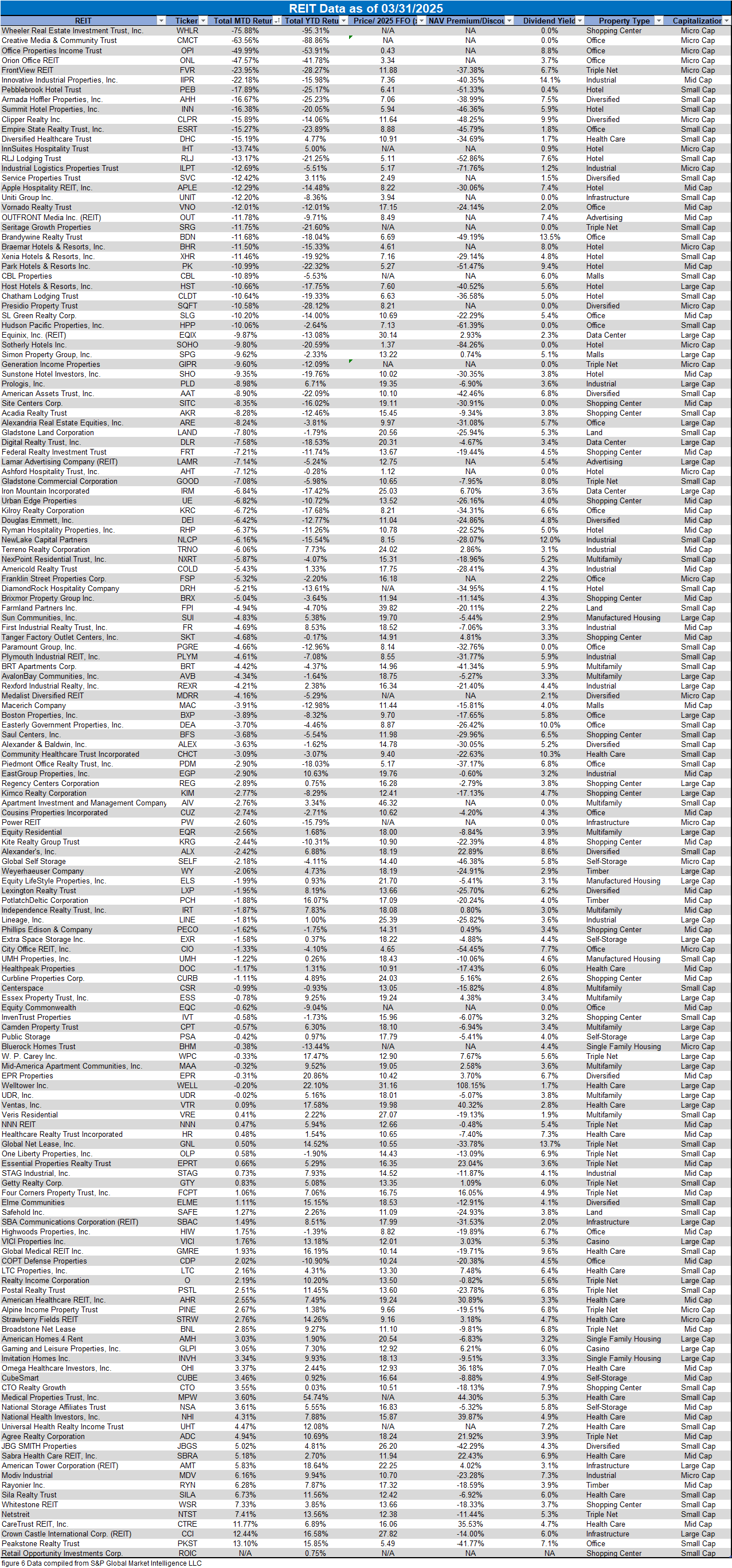
Dividend Yield
Dividend yield is an important component of a REIT’s total return. The particularly high dividend yields of the REIT sector are, for many investors, the primary reason for investment in this sector. As many REITs are currently trading at share prices well below their NAV, yields are currently quite high for many REITs within the sector. Although a particularly high yield for a REIT may sometimes reflect a disproportionately high risk, there exist opportunities in some cases to capitalize on dividend yields that are sufficiently attractive to justify the underlying risks of the investment. I have included below a table ranking equity REITs from highest dividend yield (as of 3/31/2025) to lowest dividend yield.

Although a REIT’s decision regarding whether to pay a quarterly dividend or a monthly dividend does not reflect on the quality of the company’s fundamentals or operations, a monthly dividend allows for smoother cash flow to the investor. Below is a list of equity REITs that pay monthly dividends ranked from highest yield to lowest yield.
Dividend News
8 REITs announced dividend hikes in March, 7 of which pay quarterly dividends and 1 of which pays monthly. Chatham Lodging Trust (CLDT) (+28.6%) announced the largest dividend raise, followed by CareTrust REIT (CTRE) (+15.5%), InvenTrust Properties (IVT) (+5.0%), and American Tower (AMT) (+4.9%). In total, 36 REITs increased their dividend during Q1 2025.
Significant progress has been made in recent months on bringing down inflation with the CPI falling to 2.4% in March down from 2.8% in February. Similarly, core CPI improved to 2.8% in March from 3.1% in February. This marks the lowest year-over-year inflation since March 2021. Thanks in part to the strong inflation progress in the first quarter of 2025, wage growth is handily outpacing inflation. This provides greater purchasing power to consumers and reflects a potential sign of improvement in the economy. However, there remains elevated uncertainty going forward as tariffs and potential new trade deals could have a material impact on inflation.
Valuation
REIT Premium/Discount to NAV by Property Type
Below is a downloadable data table, which ranks REITs within each property type from the largest discount to the largest premium to NAV. The consensus NAV used for this table is the average of analyst NAV estimates for each REIT. Both the NAV and the share price will change over time, so I will continue to include this table in upcoming issues of The State of REITs with updated consensus NAV estimates for each REIT for which such an estimate is available.
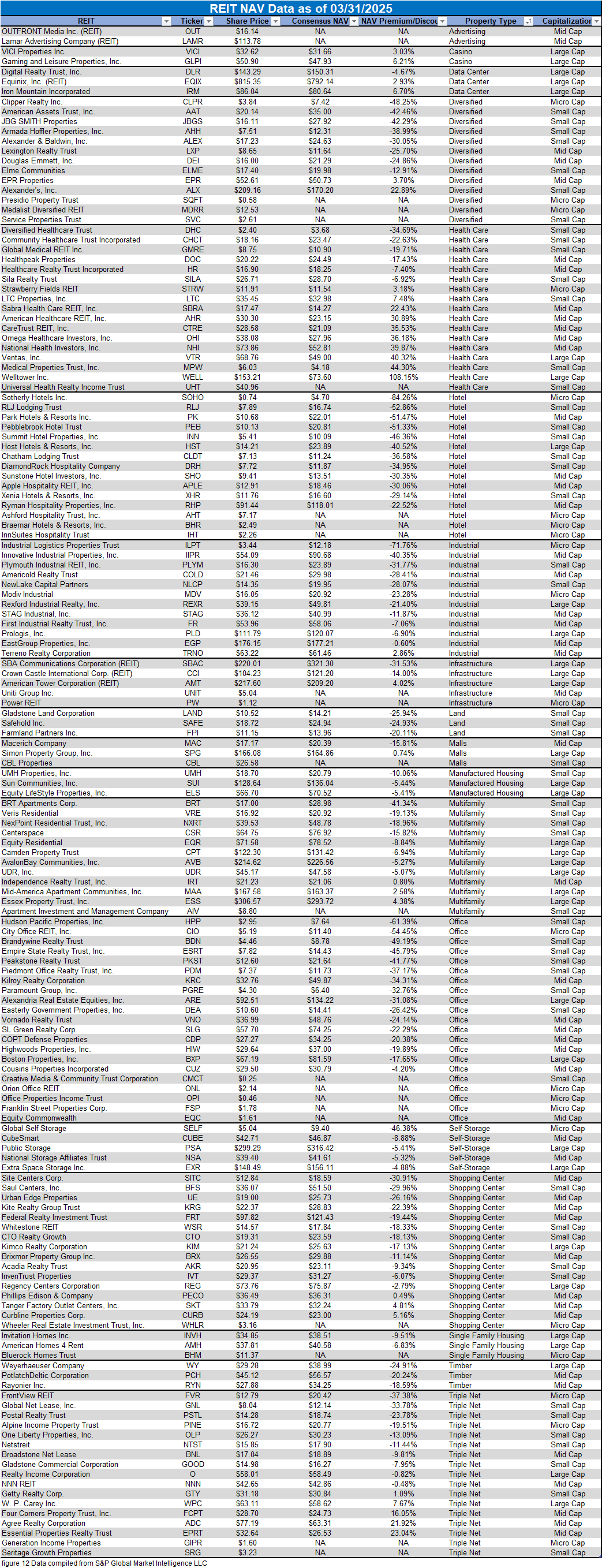
Takeaway
The large cap REIT premium (relative to small cap REITs) widened again in March and investors are now paying on average about 40% more for each dollar of 2025 FFO/share to buy large cap REITs than small cap REITs (18.1x/12.9x – 1 = 40.3%). As can be seen in the table below, there is presently a strong positive correlation between market cap and FFO multiple.
The table below shows the average NAV premium/discount of REITs of each market cap bucket. This data, much like the data for price/FFO, shows a strong, positive correlation between market cap and Price/NAV. The average large cap REIT (-3.42%) and mid cap REIT (-8.19%) trade at single-digit discounts to NAV. Small cap REITs (-24.54%) trade at about 3/4 of NAV while micro caps (-42.45%) trade at less than 3/5 of their respective NAVs.
REITs Outperformed the S&P 500 in Q1 2025 and Over The Past Year
The Dow Jones Equity All REIT Index (+2.8%) significantly outperformed the S&P 500 (-4.3%) over the first 3 months of 2025. With REITs trading at a modest 13.9x average FFO multiple as of the end of Q1, they are well positioned for potential further outperformance over the remainder of the year.
Although the S&P 500 (+8.3%) had a solid performance over the past 12 months, REITs performed slightly better with the Dow Jones Equity All REIT Index hitting a +9.2% total return over the same period.
Among equity REITs with a market cap of at least $200M, the worst performers in Q1 2025 were FrontView REIT (FVR) (-28.27%), Armada Hoffler Properties (AHH) (-25.23%) and Pebblebrook Hotel Trust (PEB) (-25.17%). Hotel and Diversified property types accounted for 10 of the 11 REITs with the lowest total return in Q1.
Medical Properties Trust handily outperformed all other REITs in Q1 with a remarkable +54.74% return with strong performances from other Health Care REITs Welltower (WELL) (+22.1%), Ventas (VTR) (+17.58%) and Global Medical REIT (GMRE) (+16.19%). Communications REITs also started the year strong with big gains from American Tower (AMT) (+18.64%) and Crown Castle (CCI) (+16.58%). There were strong bouncebacks from many of the REITs that had been oversold in 2024 as they began a sharp recovery in 2025. With 104 REITs trading below NAV at the end of Q1 and a median NAV discount of -17.43%, there is plenty of upside remaining for REITs to capture over the remainder of the year.
Important Notes and Disclosure
All articles are published and provided as an information source for investors capable of making their own investment decisions. None of the information offered should be construed to be advice or a recommendation that any particular security, portfolio of securities, transaction, or investment strategy is suitable for any specific person. The information offered is impersonal and not tailored to the investment needs of any specific person.
We cannot determine whether the content of any article or recommendation is appropriate for any specific person. Readers should contact their financial professional to discuss the suitability of any of the strategies or holdings before implementation in their portfolio. Research and information are provided for informational purposes only and are not intended for trading purposes. NEVER make an investment decision based solely on the information provided in our articles.
We may hold, purchase, or sell positions in securities mentioned in our articles and will not disclose this information to subscribers, nor the time the positions in the securities were acquired. We may liquidate shares in profiled companies at any time without notice. We may also take positions inconsistent with the information and views expressed on our website.
We routinely own and trade the same securities purchased or sold for advisory clients of 2MCAC. This circumstance is communicated to our clients on an ongoing basis. As fiduciaries, we prioritize our clients’ interests above those of our corporate and personal accounts to avoid conflict and adverse selection in trading these commonly held interests.
Past performance does not guarantee future results. Investing in publicly held securities is speculative and involves risk, including the possible loss of principal. Historical returns should not be used as the primary basis for investment decisions. Although the statements of fact and data in this report have been obtained from sources believed to be reliable, 2MCAC does not guarantee their accuracy and assumes no liability or responsibility for any omissions/errors
Commentary may contain forward-looking statements that are by definition uncertain. Actual results may differ materially from our forecasts or estimations, and 2MCAC and its affiliates cannot be held liable for the use of and reliance upon the opinions, estimates, forecasts, and findings in this article.
Through October 2021, The State of REITs was published exclusively on Seeking Alpha by Simon Bowler, Sector Analyst at 2nd Market Capital Services Corporation (2MCSC). Editions subsequent to October 2021 will be published on this website in addition to other platforms that may include Seeking Alpha. 2MCSC was formed in 1989 and provides investment research and consulting services to the financial services industry and the financial media. 2MCSC does not provide investment advice. 2MCSC is a separate entity but related under common ownership to 2nd Market Capital Advisory (2MCAC), a Wisconsin registered investment advisor. Simon Bowler is an investment advisor representative of 2MCAC. Any positive comments made by others should not be construed as an endorsement of the author's abilities to act as an investment advisor.
S&P disclosure: S&P Global Market Intelligence LLC. Contains copyrighted material distributed under license from S&P.
Discover more from 2nd Market Capital Advisory Corp
Subscribe to get the latest posts sent to your email.
